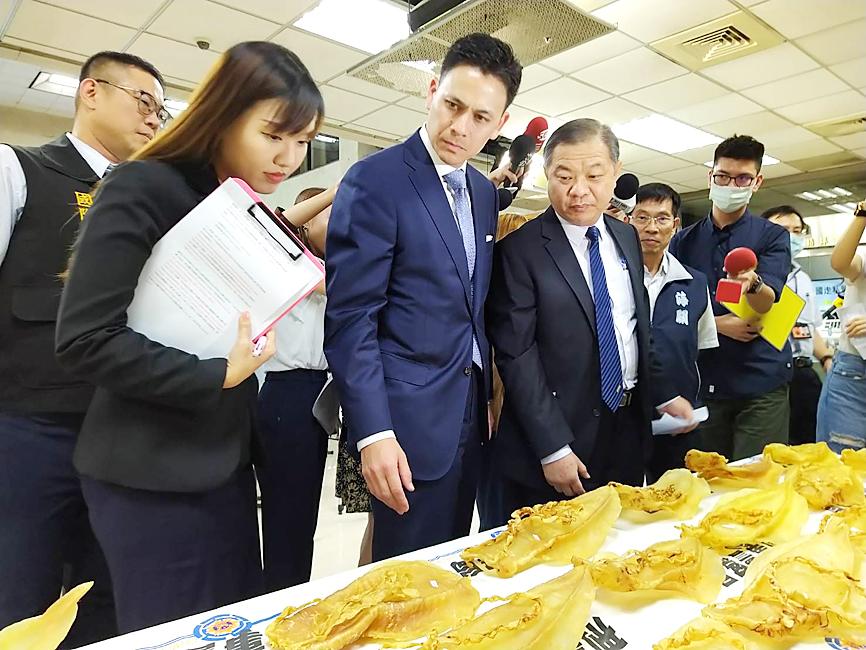A New Taipei City resident in his 30s was arrested earlier this month for allegedly smuggling totoaba swim bladders from Mexico to sell in China, as part of a months-long probe into an international smuggling ring that began with a tip-off from the FBI, the Criminal Investigation Bureau (CIB) said yesterday.
Local police and customs authorities seized 19kg of totoaba swim bladders between July 28 and Aug. 12 that had a black market price of about US$900,000, the CIB told a news conference at its office in Taipei.
CIB Deputy Commissioner Liao Hsun-cheng (廖訓誠) inspected the confiscated haul, while FBI Legal Attache Office representative in Taiwan Nicolas Garcia made a rare public appearance.

Photo: Yao Yueh-hung, Taipei Times
Liao said that the main haul was seized at Taiwan Taoyuan International Airport on Aug. 10 — 161 dried swim bladders that arrived from the US by air cargo — and CIB units followed up with searches.
The detained suspect, surnamed Yao (姚), who works in the customs brokerage business, is alleged to be the main Taiwanese member of the smuggling operation.
CIB officials said that their investigation began after they received a report from the FBI last month that the smugglers purchased the dried swim bladders of totoaba — an endangered species — and sent them via international express courier delivery services from Mexico, destined for China.
The trade in totoaba swim bladders has been illegal since 1976, when the giant fish, endemic to the Gulf of California in Mexico, was added to the Convention on International Trade in Endangered Species of Wild Fauna and Flora (CITES).
CIB officials said that Mexican poachers catch the fish, dry the swim bladders and then smuggle them to the US West Coast, where Chinese gangs send them via air mail or courier packages to Taiwan.
The bladders are then sent from Kinmen to Xiamen, in China’s Fujian Province, via the “small three links,” before moving on to Guangzhou, the CIB said.
Yao faces charges of contravening the Wildlife Conservation Act (野生動物保育法) and the Smuggling Penalty Act (懲治走私條例).
Garcia thanked the CIB and Customs Administration on behalf of the FBI and the US Fish and Wildlife Service for their efforts.

TRAGEDY STRIKES TAIPEI: The suspect died after falling off a building after he threw smoke grenades into Taipei Main Station and went on a killing spree in Zhongshan A 27-year-old suspect allegedly threw smoke grenades in Taipei Main Station and then proceeded to Zhongshan MRT Station in a random killing spree that resulted in the death of the suspect and two other civilians, and seven injured, including one in critical condition, as of press time last night. The suspect, identified as a man surnamed Chang Wen (張文), allegedly began the attack at Taipei Main Station, the Taipei Fire Department said, adding that it received a report at 5:24pm that smoke grenades had been thrown in the station. One man in his 50s was rushed to hospital after a cardiac arrest

A car bomb killed a senior Russian general in southern Moscow yesterday morning, the latest high-profile army figure to be blown up in a blast that came just hours after Russian and Ukrainian delegates held separate talks in Miami on a plan to end the war. Kyiv has not commented on the incident, but Russian investigators said they were probing whether the blast was “linked” to “Ukrainian special forces.” The attack was similar to other assassinations of generals and pro-war figures that have either been claimed, or are widely believed to have been orchestrated, by Ukraine. Russian Lieutenant General Fanil Sarvarov, 56, head

SAFETY FIRST: Double the number of police were deployed at the Taipei Marathon, while other cities released plans to bolster public event safety Authorities across Taiwan have stepped up security measures ahead of Christmas and New Year events, following a knife and smoke bomb attack in Taipei on Friday that left four people dead and 11 injured. In a bid to prevent potential copycat incidents, police deployments have been expanded for large gatherings, transport hubs, and other crowded public spaces, according to official statements from police and city authorities. Taipei Mayor Chiang Wan-an (蔣萬安) said the city has “comprehensively raised security readiness” in crowded areas, increased police deployments with armed officers, and intensified patrols during weekends and nighttime hours. For large-scale events, security checkpoints and explosives

PUBLIC SAFETY: The premier said that security would be tightened in transport hubs, while President Lai commended the public for their bravery The government is to deploy more police, including rapid response units, in crowded public areas to ensure a swift response to any threats, President William Lai (賴清德) said yesterday after a knife attack killed three people and injured 11 in Taipei the previous day. Lai made the remarks following a briefing by the National Police Agency on the progress of the investigation, saying that the attack underscored the importance of cooperation in public security between the central and local governments. The attack unfolded in the early evening on Friday around Taipei Main Station’s M7 exit and later near the Taipei MRT’s Zhongshan